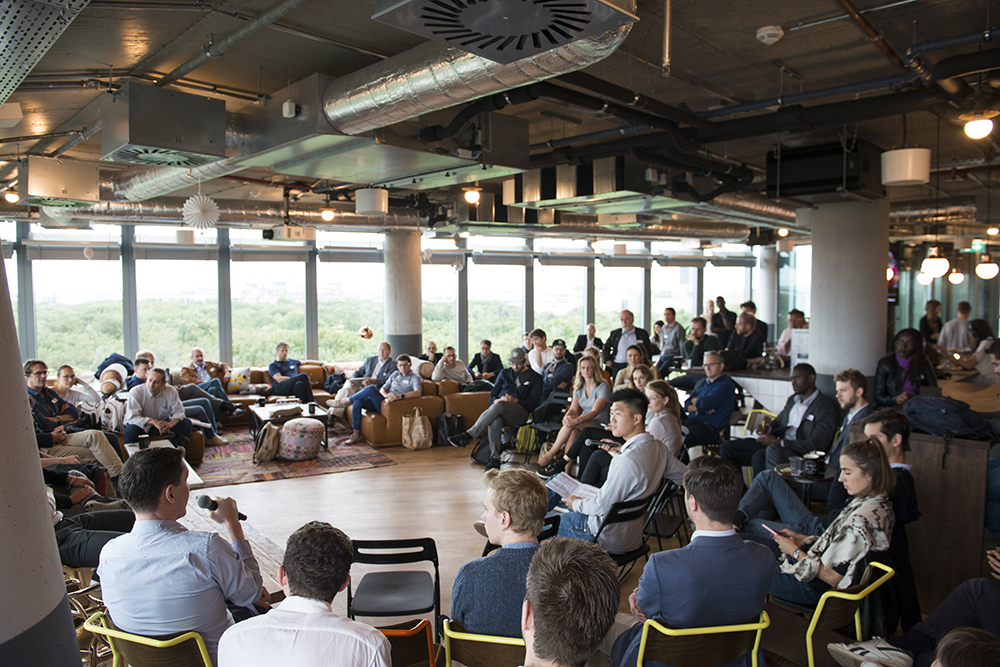
TOA 2016 is over and has left us all excited! Last Wednesday on July the 13th just before 10 AM, the legendary former GDR radio broadcasting centre the “Funkhaus” - opened its doors to host the fifth Berlin Tech Open Air.
This historic place hostet more than 150 speakers telling the tales of the future. Coders, scientists, startup-stars and artists gathered to share their visions of future technology. In addition, more than 175 so called “satellite” events all across the city invited the startup audience to pitch and participate in interactive forums, exchange ideas and start collaborations. An ambitious and promising programme.
Tech excitement
Our expectations were high, but we weren't disappointed! Even having to queue to finally get some seats in a hot studio didn't dampen our enthusiasm. Most of what we heard from developers, editors, curators, scientists, artists and – of course – a lot of founders, was well worth waiting for. We went rowing in the Caribbean, learned about smart food, sex toys, and Chinese liquor, saw loads of refreshing pitches and many extremely inspiring people.
If there's one thing to take from this event, it's perhaps the open minded, positive and playful attitude towards technological inventions, which we miss a bit in our daily work in the real estate sector. Very often telephone, pen and paper are still the predominant working tools. But new technology is coming, and to talk about which tech-trends there are in the real estate sector, we decided to host a satellite event on exactly this topic – the PropTech Trends.
Real estate, Technology, Trends
The real estate sector deals with houses. Solid “immovables” which are quite resilient towards change. Especially when it implies digitalization, it seems. To get a broad range of perspectives we invited a broad range of players, from architects to developers, software engineers, investors, brokers and landlords to join the discussion. More than 70 experts followed our invitation to share their views and visions of PropTech Trends, even more than we expected, and a clear sign of just how important this area is becoming, we think.
In the stunning “living-room” of our colleagues at Wework, we formed a circle and began the discussion or “un-conference”, as we called it, a format that works without lecturers and instead focuses on the expertise of the attendees, which as we found, was fascinatingly broad.
Co, co & co
One of the first topics was the growing interest in co-working and co-living. The trend towards the flexibility in living and working which fits the modern lifestyle of digital nomads still remains strong. Architects have remarked that while working areas have become smaller, communal spaces are requested more than ever.
In building these modern places, digitalization plays crucial role. New models of ownership, crowdfunding but also new currencies such as Block Chain will perhaps disrupt the traditional market more and more. Still, some argued, the natural human need for a “nest”, safety and stability, probably won't disappear any time soon. In turn this idea was challenged by references to Berlin in the 80's, the high-time of communal-living projects. Especially in urban areas, it seems communal living is a recurring theme, and therefore one worth taking seriously.
As topical or fashionable as co-working and co-living might be, the questions raised by the investors' side were more pragmatic, looking to identify the money and innovation in all current trends. Questions that eventually led to discussions about the technological side of those trends.
Digitalization in the house
We are already seeing innovative technology being applied in the industry; “Smart” buildings include intelligent appliances, climate control, security and entertainment systems, all collecting data for feedback and optimization.
Property search platforms are also innovating, with systems in place that work with Google and Facebook, tools for asset and property management that are used on a daily basis. On the other hand, property managers argue that they are still confronted with piles of paper and antiquated systems that could do with some digital support. The slow implementation of technology is not due to a lack of tools but to the resistance of single property managers and owners, discussion attendees remarked. The issue is simple. Technology tends to increase transparency; a lot of owners and managers however benefit from non-transparency and therefore have little interest in change. The topic of transparency was also taken up by investors, who see discretion and confidentiality being challenged. The fear of becoming known through modern technology would hold some investers back, attendees said.
Virtual reality and Gamification
The process of viewing property could do with some technological help too, it seems. 360 degree pictures and virtual reality need to become more affordable to be used on a regular basis. Another hot topic was the opportunity of gamification and augmented reality – not only as a tool in the property business but also as a promotion tool. What if games included information about existing houses, apartments or areas?
To tickle ones imagination, taking a look at other cities always helps. London, for example, was one of the first cities to digitalize the land registration database. Getting information on the same topic in Germany still requires a physical visit to the local office, something that might well change with the increasing interest in Berlin. Attendees from London were very well represented in the discussion, and their predictions, in particular post-Brexit, were pretty clear; there will be more traffic to Berlin. This could bring PropTech even more onto the radar here.
Interested in listening to some insightful thoughts on PropTech by the experts?
See here more pictures of the event.
Ready to find your dream office?
If you’re looking for an office space or need advice on finding the right space, drop us a line.
Related articles
5 ways to reduce office costs in 2024
It’s 2024, and as the year kicks into gear, you may be contemplating how to navigate the ever-evolving landscape of business expenses. Remember...
Interview with Octavian Lebert, CEO and Founder of forwaerds gmbh
For the fifth installment in our office series, “What Does the Office Space Mean to You?”, Setting sat down with Octavian Lebert, CEO and Founder...
The 9-Step Guide to Mastering Office Etiquette
Dirty dishes, forgotten glasses, or unlocked doors? How about cluttered desk spaces? Office etiquette is essential for founders, managers, and...




